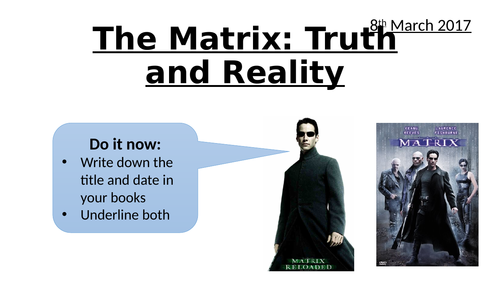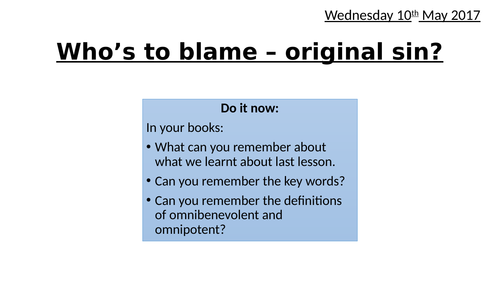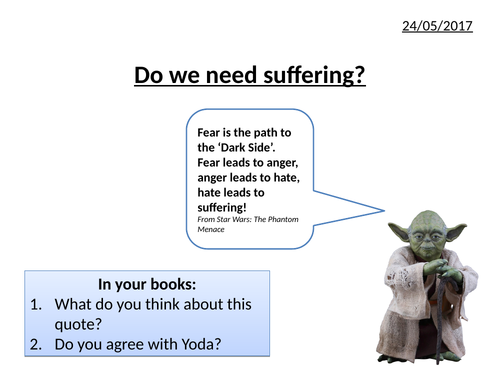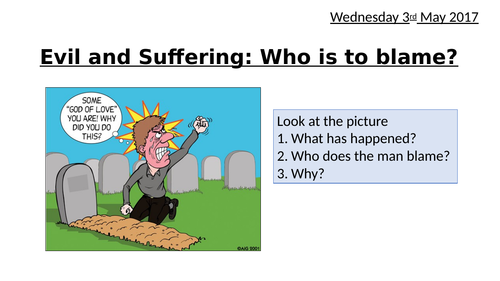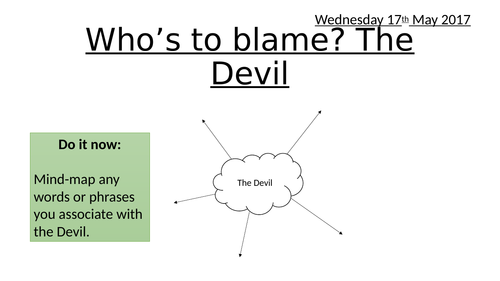338Uploads
118k+Views
41k+Downloads
Religious education

How do myths answer Big Questions?
KS3 Philosophy and Ethics - Lesson 2 of the ‘What Big Questions are there?’ Scheme of Work.
This lesson looks at ‘How do myths answer Big Questions?'
This lesson looks at how myths are used to answer some of the Big Questions, with a particular focus on the origins of the universe.
By the end of the lesson, students will be able to:
Explain why people made up myths to answer their questions, using specific examples.
Describe what a myth is and look at some examples from around the world.
Understand how primitive people tried to explain their ultimate questions.
Feedback is welcome, please check out the rest of my lessons in the ‘What Big Questions are there?’

The Matrix: Truth vs Reality
This fun lesson looks at the Matrix: Truth vs Reality and starts with Plato’s Cave. Using video clips, students complete differentiated tasks.
Suitable for 11-14 Philosophy and Ethics/ Religious Studies.
Please review if you purchase.

Evil and suffering - original sin
Who is to blame for evil and suffering? This lesson explores original sin. Whole lesson plus resources and differentiated activities included.

Buddhist Zen Gardens
Whole lesson for teaching KS2 or KS3 Buddhist Zen Gardens.
How does a zen garden express Buddhist beliefs?
This lesson looks at:
What is Zen Buddhism?
What are the Four Noble Truths?
What is a Zen Garden
What is in a Zen Garden - this looks at all the different parts of a Zen Garden, with pictures and descriptions explaining each part (such as sand, stones, water, bridges, trees and plants etc).
Students will then design their own Zen Garden.
Objectives for the lesson:
Grade 8-9: Explain the importance of Zen gardens to Buddhists.
Grade 5-7: Consider why Buddhists use Zen gardens.
Grade 3-4: Identify and describe a Buddhist Zen garden.
ALL: Design your own Zen garden and explain the different features in your Zen garden.
Feedback is welcome, please review if you purchase!

Pandora's Box
Whole lesson plus differentiated activities and links to videos. For teaching 11-16 Philosophy or Religious Education.

Do we need suffering?
Whole lesson, plus differentiated activities and resources for a lesson on do we need suffering?
Suitable for 11-14 Religious Education or Philosophy.

Who is to blame for evil and suffering?
Full lesson plus activities and for teaching who is to blame for evil and suffering. Suitable for 11-16 Philosophy and Ethics or Religious Studies.

Who is to blame? - The Devil
Whole lesson looking at who is to blame for evil and suffering - the Devil.
Whole lesson plus resources and activities.
Can be used for 11-14 Philosophy or Religious Education.
Bundle

Evil and Suffering Scheme of Work
SAVE 25%!!!
Whole Scheme of Work for teaching the unit Evil and Suffering for Religious Studies/Philosophy and Ethics.
All 5 lessons include differentiated resources, activities, and everything you need to teach it straight away.
Starts off with looking into the idea of evil and suffering with Pandora’s box, the following lessons explore the idea of who is to blame - the Devil, us, and do we need suffering?
Pandora’s Box
Who is to blame
Original Sin
The Devil
Do we need suffering?
Please review if you purchase.
Bundle

Religion and Science SOW BUNDLE!
Religion and Science Scheme of Work BUNDLE!
Suitable for KS3 Religious Studies / Philosophy and Ethics
This bundle includes 7 lessons - all fully resourced!
This Scheme of Work explores both Religion and Science - looking at religious and scientific explanations for the origins of the universe and humanity with an overarching question of whether BOTH can be used side by side to explain our origins.
Lessons included:
What is religion?
What is the religious method?
What is science?
Did the universe begin with a Big Bang?
Story of Genesis
Theory of Evolution
Adam and Eve
Please review if you purchase.
Bundle

Islam SOW BUNDLE!
Islam Scheme of Work BUNDLE!
Suitable for KS3 Religious Studies / Philosophy and Ethics
This bundle includes 6 lessons - all fully resourced!
This Scheme of Work explores Islam in depth, looking at what it is like to be a Muslim. Included is a lesson on Islamophobia, an important lesson for students taught in a sensitive way.
Lessons included:
Introduction to Islam
Five Pillars of Islam
Features of a Mosque
Why do Muslims go on Hajj?
Respecting the Qu’ran
Islamophobia
Please review if you purchase.


